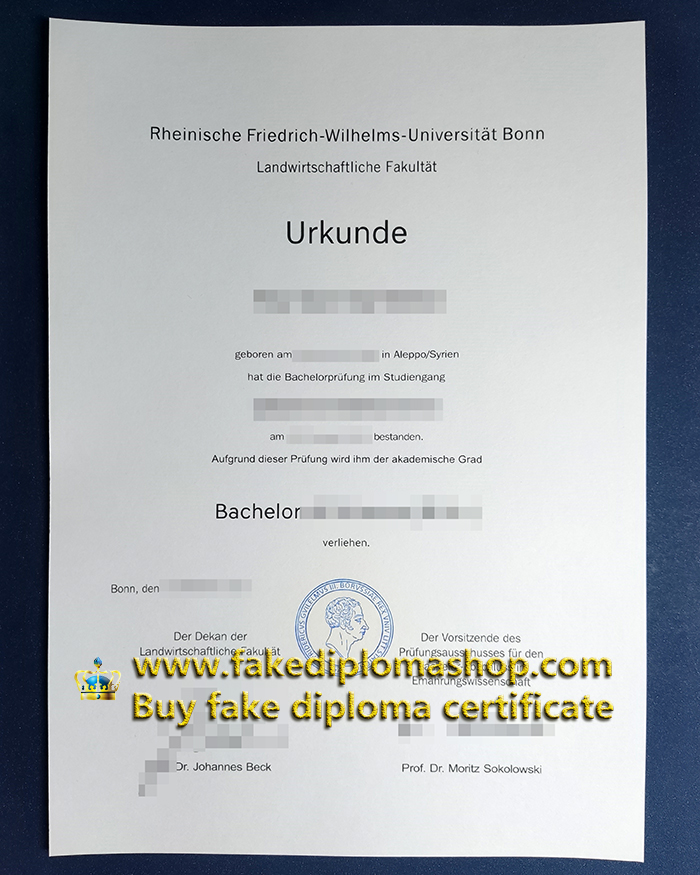
Rheinische Friedrich-Wilhelms-Universität Bonn diploma, University of Bonn diploma
Rheinische Friedrich-Wilhelms-Universität Bonn diploma for sale, buy fake University of Bonn diploma. Is getting into University of Bonn degree easy? How much to purchase a fake diploma from Rheinische Friedrich-Wilhelms-Universität Bonn? Can I buy a fake Rheinische Friedrich-Wilhelms-Universität Bonn degree in Germany? The Rhenish Friedrich Wilhelm University of Bonn (German: Rheinische Friedrich-Wilhelms-Universität Bonn) is a public research university located in Bonn, North Rhine-Westphalia, Germany.
The University of Bonn is a product of the Enlightenment in the 18th century, and its fields of mathematics, social sciences (politics, law, philosophy and economics) and medicine are famous all over the world. Among the graduates of the University of Bonn are many Nobel Prize winners, Fields Medalists, Leibniz Prize winners and Pritzker Prize winners. Kaiser Wilhelm II of Germany, Adenauer, the first Chancellor of the Federal Republic of Germany, Marx, Habermas, Heine, Nietzsche, etc. all studied at the University of Bonn.
Bonn is a comprehensive higher education institution. Formerly known as the Max Academy established in Cologne by the Principality of Cologne in 1777, it was changed to a university in 1784. It was closed after 1798. In 1818, the Prussian government ordered the rebuilding of the original Electoral Palace in Bonn.
In 1828 it changed to its present name. Following the example of the University of Berlin, the University of Bonn promulgated its charter in 1827, emphasizing the combination of teaching and research, and respecting academic freedom as the guiding principle of running a school. During the Nazi rule, it was severely damaged. After World War II, the school was rapidly restored and developed. There are Christian Seminary, Catholic Seminary, School of Mathematics and Natural Sciences, School of Medicine, School of Philosophy, School of Law and Economics, School of Agriculture, and School of Education.
There are Institutes of Water Conservancy Law, Institute of Dynamic Law, Max Planck Institute of Radio Astronomy, Institute of Savings, Exchange and Credit Industry, Rhine-Westphalia Institute of Instrumental Mathematics, Oriental Language Research Office, etc. Among them, law, philosophy and medicine (especially medical surgery) are famous subjects at the University of Bonn.
What is the difference between a Rheinische Friedrich-Wilhelms-Universität Bonn diploma and an associate’s degree?
The school currently has 8 colleges, namely: Christian Seminary, Catholic Seminary, School of Law and Economics, School of Medicine, School of Philosophy, School of Mathematics and Natural Sciences, School of Agriculture and School of Education. In addition, there are more than a dozen research institutions directly under the school, such as the Institute of Archaeology, the Language Experiment Center, the Astronomy Research Center and so on.
The University of Bonn does have a number of directly affiliated research institutes that complement teaching and research tasks. These are: The Franz-Dürger Institute, founded in 1966, studies the late Greco-Roman period, especially the transitional phases of Mediterranean ancient cultures. Many of the staff of the institute are experts from foreign countries. The Old Catholic Theological Study Group, founded in 1901, is funded by the Episcopal Study Group and the Old Catholic Church of Bonn. It is the only Old Catholic Research Institute in Germany so far. It is dedicated to cultivating reserve forces for Old Catholic teaching and research.

